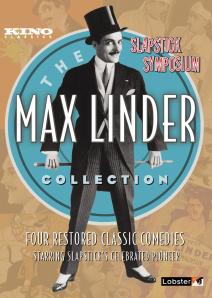 If any silent film star is due for a revival of interest in their work, it’s Max Linder. In 1905, Linder started making films in France for Pathé Films and gained popularity playing his character “Max,” a very dapper type always dressed to the nines with his signature silk top hat. By 1910, Max Linder had become the world’s first international movie star and it wasn’t long before he was commanding a salary of a million Francs a year.
If any silent film star is due for a revival of interest in their work, it’s Max Linder. In 1905, Linder started making films in France for Pathé Films and gained popularity playing his character “Max,” a very dapper type always dressed to the nines with his signature silk top hat. By 1910, Max Linder had become the world’s first international movie star and it wasn’t long before he was commanding a salary of a million Francs a year.
Max Linder’s films influenced many of the most celebrated comedians in film history — Charlie Chaplin, Buster Keaton, Harold Lloyd, The Marx Brothers. Some of Linder’s other famous fans included King Vidor, Mack Sennett, and Adolphe Menjou. Like Chaplin, Keaton, and Lloyd, Linder was more than just an actor and also wrote and directed many of his own films. However, after Linder moved from France to the United States in 1916, he struggled to win over American audiences. He returned to France in 1922 and died three years later. Despite being such an influential figure, Max Linder hasn’t gotten nearly as much recognition as he deserves.
If you’re interested in exploring some of Max Linder’s work for yourself, Kino Classics has just released The Max Linder Collection, a DVD featuring four films he made during his time in America. The set includes 1922′s The Three Must-Get-Theres, a delightful parody of Douglas Fairbanks in The Three Musketeers; 1921′s Be My Wife; 1921′s Seven Years Bad Luck; and 1917′s Max Wants a Divorce. The Max Linder Collection is only available on standard DVD, not blu-ray, and doesn’t include any bonus features, but the movies alone are enough to make it worth buying.
All four films in The Max Linder Collection have been lovingly restored and look fantastic. The source material for Max Wants a Divorce isn’t as pristine as the source material for the others, but it still looks pretty good for a movie made nearly a century ago. Of the four movies, the only one I had seen before was Seven Years Bad Luck, which I really liked. The other three movies were a revelation for me. They showed Max to be a gifted, wonderfully imaginative comedian who was way ahead of the game. Why these movies weren’t big hits with American audiences at the time is beyond me because I found all of them to be quite delightful. The Max Linder Collection is a great way to be introduced to one of silent film’s most overlooked pioneers.
Disclosure: I received a review copy from Kino Lorber.
